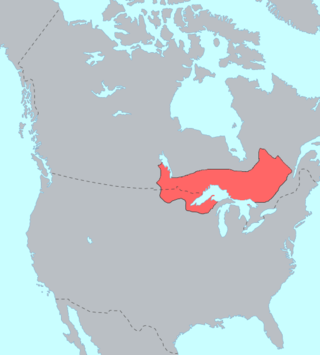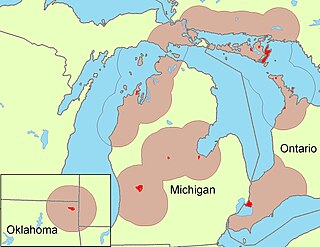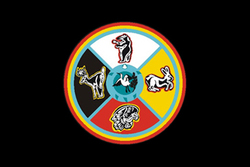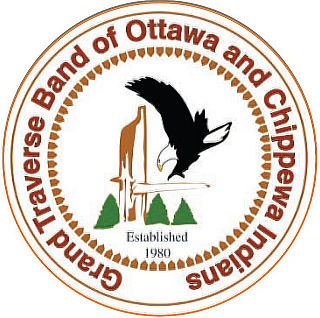
The Ojibwe are an Anishinaabe people whose homeland covers much of the Great Lakes region and the northern plains, extending into the subarctic and throughout the northeastern woodlands. The Ojibwe, being Indigenous peoples of the Northeastern Woodlands and of the subarctic, are known by several names, including Ojibway or Chippewa. As a large ethnic group, several distinct nations also consider themselves Ojibwe, including the Saulteaux, Nipissings, and Oji-Cree.

The Potawatomi, also spelled Pottawatomi and Pottawatomie, are a Native American people of the Great Plains, upper Mississippi River, and western Great Lakes region. They traditionally speak the Potawatomi language, a member of the Algonquian family. The Potawatomi call themselves Neshnabé, a cognate of the word Anishinaabe. The Potawatomi are part of a long-term alliance, called the Council of Three Fires, with the Ojibwe and Odawa (Ottawa). In the Council of Three Fires, the Potawatomi are considered the "youngest brother". Their people are referred to in this context as Bodéwadmi, a name that means "keepers of the fire" and refers to the council fire of three peoples.

Ojibwe, also known as Ojibwa, Ojibway, Otchipwe, Ojibwemowin, or Anishinaabemowin, is an indigenous language of North America of the Algonquian language family. The language is characterized by a series of dialects that have local names and frequently local writing systems. There is no single dialect that is considered the most prestigious or most prominent, and no standard writing system that covers all dialects.

The Odawa are an Indigenous American people who primarily inhabit land in the Eastern Woodlands region, now in jurisdictions of the northeastern United States and southeastern Canada. Their territory long preceded the creation of the current border between the two countries in the 18th and 19th centuries.

The Anishinaabe are a group of culturally related Indigenous peoples in the Great Lakes region of Canada and the United States. They include the Ojibwe, Odawa, Potawatomi, Mississaugas, Nipissing, and Algonquin peoples. The Anishinaabe speak Anishinaabemowin, or Anishinaabe languages that belong to the Algonquian language family.

The Bad River LaPointe Band of the Lake Superior Tribe of Chippewa Indians or Bad River Tribe for short are a federally recognized tribe of Ojibwe people. The tribe had 6,945 members as of 2010. The Bad River Reservation is located on the south shore of Lake Superior and has a land area of about 193.11 square miles (500.15 km2) in northern Wisconsin, straddling Ashland and Iron counties. Odanah, the administrative and cultural center, is located five miles (8.0 km) east of the town of Ashland on U.S. Highway 2. The reservation population was 1,545 in 2020. Most of the reservation is managed as undeveloped forest and wetland, providing a habitat for wild rice and other natural resources.

The Sault Ste. Marie Tribe of Chippewa Indians, commonly shortened to Sault Tribe of Chippewa Indians or the more colloquial Soo Tribe, is a federally recognized Native American tribe in what is now known as Michigan's Upper Peninsula. The tribal headquarters is located within Sault Ste. Marie, the major city in the region, which is located on the St. Marys River.

The Lac Courte Oreilles Tribe is one of six federally recognized bands of Ojibwe people located in present-day Wisconsin. It had 7,275 enrolled members as of 2010. The band is based at the Lac Courte Oreilles Indian Reservation in northwestern Wisconsin, which surrounds Lac Courte Oreilles. The main reservation's land is in west-central Sawyer County, but two small plots of off-reservation trust land are located in Rusk, Burnett, and Washburn counties. The reservation was established in 1854 by the second Treaty of La Pointe.

The Grand Traverse Band of Ottawa and Chippewa Indians is a federally recognized Native American tribe located in northwest Michigan on the Leelanau Peninsula. Sandra Witherspoon is the current tribal chairperson, elected in May 2024 to a four-year term after succeeding David Arroyo, who served a single term from 2020 to 2024.

Ottawa or Odawa is a dialect of the Ojibwe language spoken by the Odawa people in southern Ontario in Canada, and northern Michigan in the United States. Descendants of migrant Ottawa speakers live in Kansas and Oklahoma. The first recorded meeting of Ottawa speakers and Europeans occurred in 1615 when a party of Ottawas encountered explorer Samuel de Champlain on the north shore of Georgian Bay. Ottawa is written in an alphabetic system using Latin letters, and is known to its speakers as Nishnaabemwin 'speaking the native language' or Daawaamwin 'speaking Ottawa'.
The Ottawa Tribe of Oklahoma is one of four federally recognized Native American tribes of Odawa people in the United States. Its Algonquian-speaking ancestors had migrated gradually from the Atlantic coast and Great Lakes areas, reaching what are now the states of Michigan and Ohio in the 18th century. In the late 1830s the United States removed the Ottawa to west of the Mississippi River, first to Iowa, then to Kansas in what was Indian Territory.
The Nottawaseppi Huron Band of Potawatomi (NHBP) is a federally-recognized tribe of Potawatomi in the United States. The tribe achieved federal recognition on December 19, 1995, and currently has approximately 1500 members.
The Lake Superior Chippewa are a large number of Ojibwe (Anishinaabe) bands living around Lake Superior; this territory is considered part of northern Michigan, Wisconsin, and Minnesota in the United States. They migrated into the area by the seventeenth century, encroaching on the Eastern Dakota people who had historically occupied the area. The Ojibwe defeated the Eastern Dakota, who migrated west into the Great Plains after the final battle in 1745. While they share a common culture including the Anishinaabe language, this highly decentralized group of Ojibwe includes at least twelve independent bands in the region.

The Little Traverse Bay Bands of Odawa Indians is a federally recognized Native American tribe of Odawa. A large percentage of the more than 4,000 tribal members continue to reside within the tribe's traditional homelands on the northwestern shores of the state of Michigan's Lower Peninsula. The historically delineated reservation area, located at 45°21′12″N84°58′41″W, encompasses approximately 336 square miles (870 km2) of land in Charlevoix and Emmet counties. The largest communities within the reservation boundaries are Harbor Springs, where the tribal offices are located; Petoskey, where the Tribe operates the Odawa Casino Resort; and Charlevoix.
The Central Algonquian languages are commonly grouped together as a subgroup of the larger Algonquian family, itself a member of the Algic family. Though the grouping is often encountered in the literature, it is an areal grouping, not a genetic grouping. In other words, the languages are grouped together because they were spoken near one another, not because they are more closely related to one another than to other Algonquian languages. Within the Algonquian family, only Eastern Algonquian is a valid genealogical group.
Anishinaabe tribal political organizations are political consortiums of Anishinaabe nations that advocate for the political interests of their constituencies. Anishinaabe people of Canada are considered as First Nations, and of the United States as Native Americans.
The Match-e-be-nash-she-wish Band of Pottawatomi Indians of Michigan is a federally recognized tribe of Potawatomi people in Michigan named for a 19th-century Ojibwe chief. They were formerly known as the Gun Lake Band of Grand River Ottawa Indians, the United Nation of Chippewa, Ottawa and Pottawatomi Indians of Michigan, Inc., and the Gun Lake Tribe or Gun Lake Band. They are headquartered in Bradley, Michigan.

The Mackinac Bands of Chippewa and Ottawa Indians is a non-profit organization for people who self-identify as being of Ojibwe and Odawa descent, based in the state of Michigan. The organization is headquartered in St. Ignace, Mackinac County and has around 4,000 members. Today most members live in Mackinac, Chippewa, Emmet, Cheboygan, and Presque Isle counties, however many members are also located throughout the state of Michigan and the United States. The organization is not recognized by the State of Michigan or by the US federal government.
The Inter-Tribal Council of Michigan (ITCM) is a joint Tribal organization which represents the twelve federally recognized Native American tribes in the state of Michigan. It was organized as a 501(c)(3) organization in 1968 by four Michigan tribes with the intention to pool resources and aid in negotiations with non-tribal government bodies. The organization has since incorporated the other eight federally recognized tribes in Michigan and provides programs to improve the health and welfare of Native Americans in Michigan.










